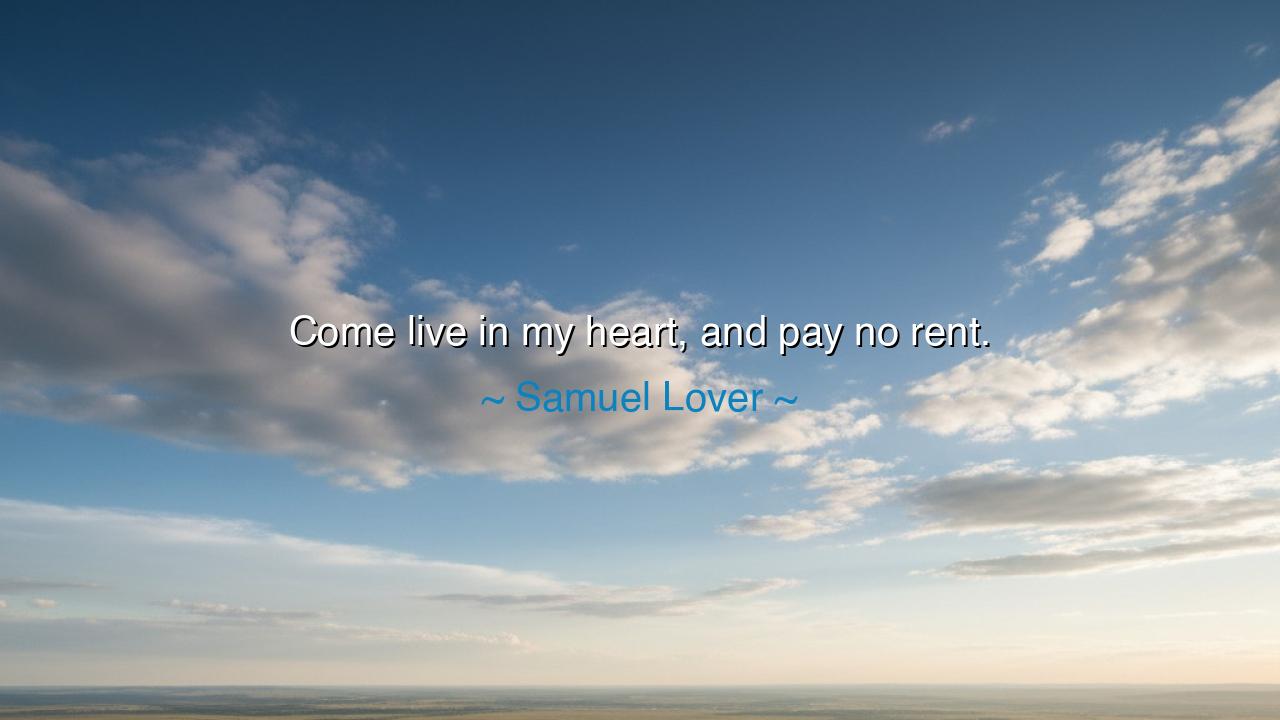
Come live in my heart, and pay no rent.






When Samuel Lover wrote the tender words, “Come live in my heart, and pay no rent,” he distilled into one simple phrase the boundless generosity of love — the desire to give everything and ask for nothing in return. A poet, musician, and novelist of nineteenth-century Ireland, Lover was no stranger to the language of emotion. His words, light and lyrical, speak of a heart so open that it welcomes another soul without condition or cost. To invite someone to “live in one’s heart” is the ultimate act of trust; to ask for “no rent” is the declaration that true love is not a contract, but a gift.
In these words lies a wisdom deeper than romance. Love without rent is love free of transaction, free of demand, free of fear. It is the love of the mother who watches over her child through sleepless nights, expecting no repayment; the love of a friend who stays beside you when the world falls silent; the love of the soul that gives simply because giving is its nature. Lover’s line reminds us that genuine affection cannot be bargained or measured. The heart, when it truly loves, does not keep accounts.
The ancients would have understood this truth well. They taught that love is the currency of the divine, and that the heart is a temple, not a marketplace. In the teachings of the sages, the act of offering one’s heart freely is the highest form of generosity — for in doing so, one gives not gold or land, but the sanctuary of one’s being. To welcome another into your heart is to open the gates of your soul, to say: “Here, you are safe. You owe me nothing but your presence.” Such love transforms both the giver and the receiver, for it dissolves the walls that keep souls apart.
History, too, bears witness to this kind of love. Consider St. Thérèse of Lisieux, known as “The Little Flower,” who dedicated her brief life to loving others without expectation. She said, “My vocation is love,” and she lived those words — forgiving when wronged, comforting when unthanked, praying for those who never knew her name. She did not seek reward, yet her spirit touched millions. Her love was a living echo of Lover’s verse — a heart open to all, charging no rent for the grace it gave.
But how difficult it is, in our modern age, to love this way. We are taught to measure affection by return — to expect gratitude, loyalty, or recognition. Yet such expectations, though natural, often turn love into debt. Lover’s gentle plea calls us back to purity — to love without fear of loss, without calculation, without pride. It is not weakness to love freely; it is strength, for it means we have found abundance within ourselves. A heart that gives without seeking to be repaid is a heart that will never be poor.
Still, the wise know that love without rent does not mean love without boundaries. It is not the surrender of self, but the triumph of spirit. To give love freely does not mean to let others take advantage of it, but to let your love remain undefiled by bitterness. You may close the door of your heart to those who wound, but you do not close the window through which compassion shines. Love without rent is not naïve; it is eternal. It gives, even in silence, even in distance, even in forgiveness.
So, let this be your lesson: make your heart a home, not a fortress. Let it be a place where others may rest and feel peace, where love does not demand payment or proof. When you give love without condition, you participate in the very act of creation — for love, freely given, multiplies. Do not count the cost of kindness, for its return is measured not in coin, but in joy.
Thus, as Samuel Lover teaches, “Come live in my heart, and pay no rent.” It is both invitation and philosophy — a call to love beyond transaction, to give as the sun gives light. Let your love be like the morning sky, asking nothing of the earth it warms. For in giving without price, you will discover that love, the one true treasure of the soul, can never be spent — only shared, forever, without end.






AAdministratorAdministrator
Welcome, honored guests. Please leave a comment, we will respond soon